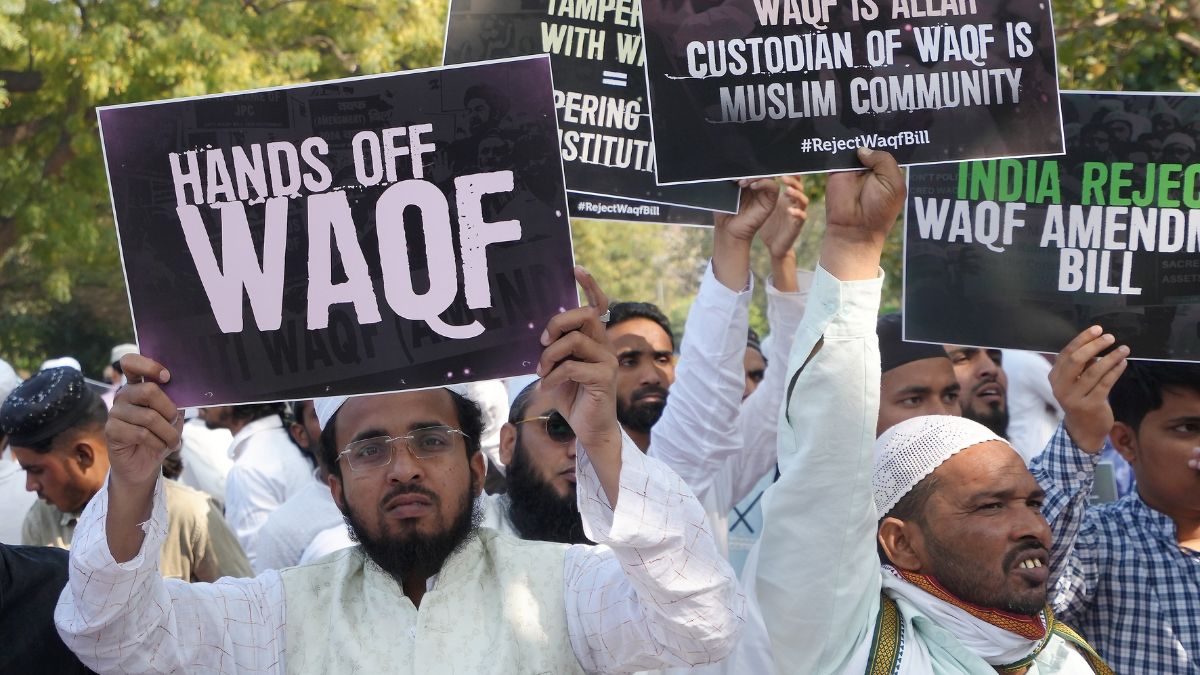It was a busy week for India. United States President Donald Trump’s sweeping tariffs were unveiled this week, raising fears of a global trade war and recession. However, it may not be all bad news for India.
Besides Trump’s “reciprocal” tariffs, the Waqf (Amendment) Bill, 2024, dominated the headlines. The legislation to bring changes to the Waqf Act, 1995, was cleared in the Lok Sabha and the Rajya Sabha amid fierce objections from opposition parties. Protests have broken out across the country against the Waqf bill.
In other news, Buddhist monks have been protesting in Bihar’s Bodh Gaya — one of the holiest places in Buddhism — for months now. They are demanding the repeal of the Bodh Gaya Temple Act (BTA), 1949.
We explore this and more in our weekly roundup from India.
1. US President Donald Trump announced new tariffs on April 2, what he dubbed as ‘Liberation Day’. The White House will impose a baseline tariff of 10 per cent on all goods coming into the US, along with “reciprocal” tariffs on nearly 60 trading partners it says are “worst offenders”.
The US has targeted India with a 27 per cent import tax. Reacting to the new tariff, the Commerce Ministry said it is analysing the impact of the levies. “It is a mixed bag and not a setback for India,” a government official said.
Some sectors in India could actually gain from the new US trade policy. India’s pharmaceutical exports have been exempted from Trump’s tariffs. Indian apparel and textiles have been hit but could benefit in the future. We explain in this story how Indian imports to the US will be affected.
2. The Waqf (Amendment) Bill, 2024, was passed in Parliament amid hourslong heated debate. It amends the 1995 Waqf Act, which governs the management of Waqf properties in the country. The Rajya Sabha passed the legislation by 128-95 votes after a marathon debate of 12 hours. The bill was earlier cleared in the Lok Sabha hurdle by 288 votes in favour and 232 against.
However, its passage has stirred mass protests across the country. After Friday’s weekly prayers by the Muslim community, thousands of protesters took to the streets in Kolkata, Chennai, and Ahmedabad against the bill. Read our report on this.
3. Over the past two months, nearly 100 Buddhist monks have been protesting at the Mahabodhi Temple, one of the most sacred shrines of Buddhism, in Bodh Gaya. Several Buddhist groups under the umbrella of the All India Buddhist Forum (AIBF) have been demanding the repeal of the Bodh Gaya Temple Act (BTA), 1949.
The BTA led to the establishment of the Bodhgaya Temple Management Committee (BTMC) that manages the Mahabodhi Temple. The control over the shrine is a longstanding dispute between Hindus and Buddhists. We explain the issue in this story.
4. We may soon know how rich the judges in the top court of India are. All 33 judges of the Supreme Court have reached a decision to publicly disclose their assets by publishing the details on the apex court’s website. This comes amid the controversy of the alleged discovery of wads of cash at the official house of Justice Yashwant Varma.
While other public servants have to reveal their wealth to the public, it is not mandatory for the judges. This has led to a debate about judicial transparency. Read our report to know more.
5. Indian Foreign Service (IFS) officer Nidhi Tewari is the new private secretary of Prime Minister Narendra Modi. She presently works at the Prime Minister’s Office (PMO) as the Deputy Secretary.
Vivek Kumar and Hardik Satishchandra Shah previously served as the PM’s private secretaries. Tewari, who is reportedly from Varanasi, is believed to be among the youngest officers to hold the post. We take a look at who she is here .
6. The famous Siddhivinayak Temple in Mumbai is among India’s richest shrines. The famous Hindu temple devoted to Lord Ganesh earned Rs 133 crore in annual revenue in the financial year 2024-25, a 15 per cent surge from its previous earnings.
The Siddhivinayak temple’s revenue could further see a boost in the coming year. So, how did the shrine increase its earnings in a year? Read our story to find out.
7. Details of industrialist Ratan Tata’s will have been making rounds since his death last October. While most of his estimated Rs 10,000-crore wealth has been donated to charity, the late Tata Group chairman’s family, friends, staff and pets have also found a place in his will.
The executors of Tata’s will are his two half-sisters Shireen Jejeebhoy and Deanna Jejeebhoy, Tata Trusts trustee Darius Khambata, and his friend Mehli Mistry. Now, it has come to light that there is a clause that could potentially exclude a beneficiary from the late businessman’s will. We explain here .
This is all we have for you this week. If you like our explainers, you may bookmark this page to stay updated.
)